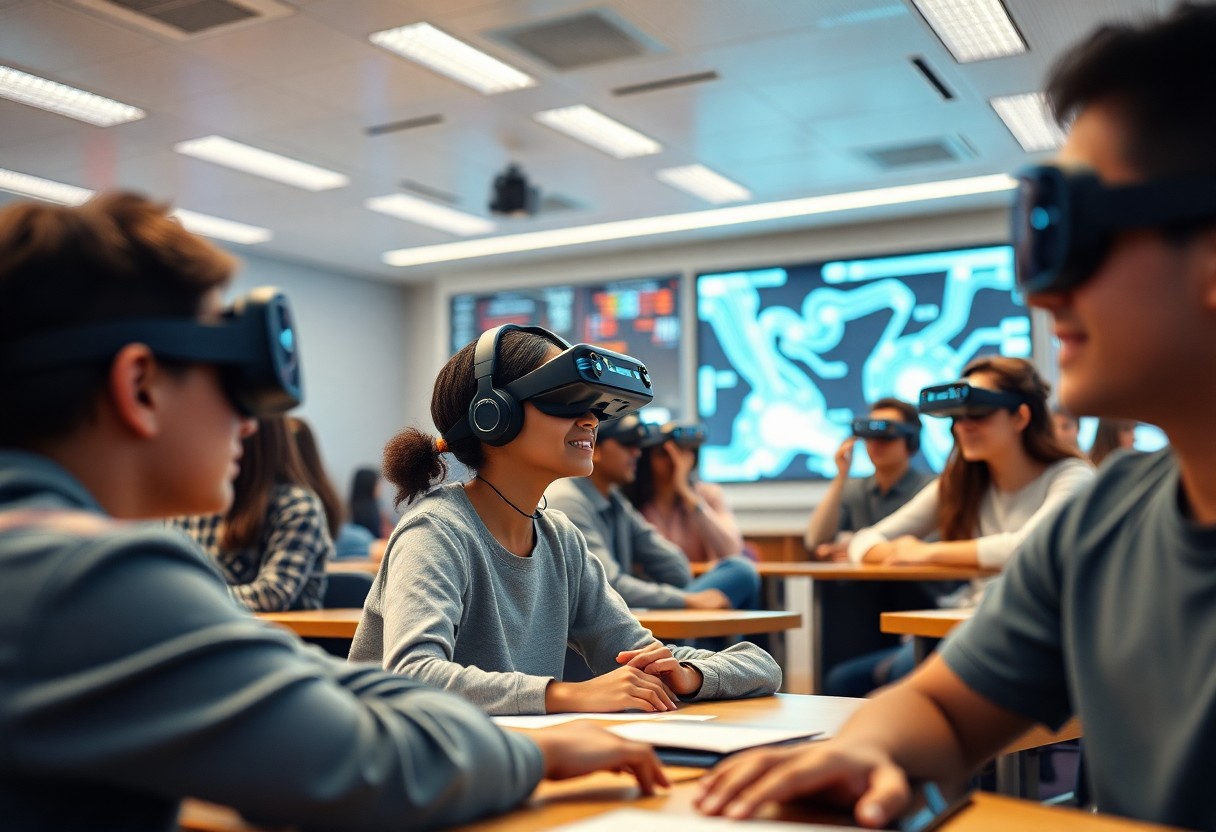Personalized education tailored to each student’s unique learning style and pace has long been an educational ideal. In recent years, artificial intelligence has emerged as a powerful tool in making this dream a reality. From adaptive learning platforms to smart tutoring systems, AI has the potential to revolutionize the way students learn. However, with this promise comes challenges such as privacy concerns and the risk of reinforcing educational inequalities. This article will explore the role of AI in shaping the future of personalized education and its implications for students of all backgrounds.

The Current State of Education
One-Size-Fits-All Approach
For decades, the education system has predominantly followed a one-size-fits-all approach, where students are expected to learn at the same pace, using the same methods and materials. This uniform way of teaching fails to take into account the diverse learning styles, interests, and paces at which students absorb information.
Limitations of Traditional Teaching Methods
Education is facing the challenge of catering to individual student needs within the constraints of a traditional classroom setting. One of the most important limitations of traditional teaching methods is that they do not adapt to the learning preferences of each student. This can lead to disengagement, frustration, and ultimately, hindered academic growth for many learners.
Additionally, traditional teaching methods often rely heavily on lectures, textbooks, and rote memorization, which may not effectively engage students or facilitate long-term retention of information. As a result, many students struggle to stay motivated and fail to reach their full potential under such rigid educational structures.
The Promise of AI in Education
Personalization Through Machine Learning
Little by little, AI technology is transforming the education sector by offering personalized learning experiences to students. Machine learning algorithms have the capability to analyze vast amounts of data on students’ learning patterns, preferences, and performance to create customized learning paths. By identifying strengths and weaknesses, AI can tailor educational content to suit individual needs, ensuring that each student receives the support they require to succeed.
Adaptive Learning Systems
Any educational institution aiming to enhance student engagement and learning outcomes should consider integrating adaptive learning systems powered by AI. These systems can dynamically adjust the pace and difficulty of learning materials based on a student’s interactions and comprehension. By providing real-time feedback and adapting content to suit the student’s proficiency level, AI-driven adaptive learning systems can foster a more effective and efficient learning process.
With adaptive learning systems, educators can gain valuable insights into each student’s progress and areas that may require additional support. By tracking performance data and identifying patterns, teachers can intervene proactively and provide targeted assistance, ultimately improving student performance and overall learning outcomes.
The potential of AI in education is immense, with the ability to revolutionize traditional teaching methods and unlock new possibilities for personalized learning. By leveraging AI technologies such as machine learning and adaptive systems, educators can cater to the individual needs of students, enhance engagement, and improve academic success rates. However, it is crucial to approach the integration of AI in education thoughtfully, considering ethical implications and ensuring that technology complements, rather than replaces, the role of teachers in the learning process.
AI-Driven Learning Platforms
Clearly, AI-driven learning platforms have the potential to revolutionize education by providing personalized learning experiences to every student. These platforms leverage artificial intelligence and machine learning algorithms to tailor educational content and pace to each individual’s needs, interests, and learning style.
Intelligent Tutoring Systems
On the forefront of AI-driven learning platforms are Intelligent Tutoring Systems (ITS), which provide real-time feedback and guidance to students as they progress through lessons. By analyzing students’ responses and interactions, ITS can adapt the difficulty level of tasks, provide additional explanations or examples where needed, and even predict student performance trends. This level of personalized attention has shown to significantly improve student learning outcomes and engagement.
Virtual Learning Environments
AIDriven virtual learning environments create immersive and interactive experiences for students, allowing for hands-on learning in a digital space. These platforms can simulate real-world scenarios, facilitate group collaboration, and offer instant feedback on student performance. Virtual Learning Environments have the potential to make learning more engaging and effective, especially for subjects that require practical application and experimentation.
To conclude, AI-driven learning platforms hold great promise in providing personalized education to every student. By leveraging artificial intelligence and machine learning, these platforms can adapt to individual learning needs, provide real-time feedback, and create interactive learning experiences that cater to diverse learning styles. With further advancements in AI technology, the future of education may indeed be personalized and tailored to each student’s unique abilities and preferences.
The Role of AI in Student Assessment
Your educational journey can be enhanced and personalized through the use of artificial intelligence in student assessment. AI technologies are revolutionizing the way educators evaluate and support student learning, offering a range of benefits that traditional methods may not provide.
Automated Grading and Feedback
On the forefront of AI in student assessment is automated grading and feedback systems. These technologies can efficiently evaluate student responses to assignments, quizzes, and exams, providing instantaneous feedback to help students understand their mistakes and improve their performance. By automating the grading process, educators can dedicate more time to developing personalized learning strategies for each student.
Identifying Knowledge Gaps
Feedback powered by AI goes beyond just providing grades; it can also help identify knowledge gaps in each student’s understanding of a subject. By analyzing patterns in student responses, AI can pinpoint areas where a student may be struggling and provide targeted resources to help them improve. This level of personalized support is invaluable in creating a tailored learning experience for every student.
AI-driven assessment tools can analyze vast amounts of data to provide educators with insights into each student’s unique learning journey. By identifying knowledge gaps early on, educators can intervene with targeted interventions to support student success.
AI-Assisted Teacher Support
Now, let’s probe into how AI can assist teachers in providing personalized education to every student. One key area where AI can be particularly beneficial is in intelligent lesson planning.
Intelligent Lesson Planning
Lesson planning can be a time-consuming task for teachers, especially when they have to cater to the diverse learning needs of each student. AI-powered tools can analyze student data, including past performance, learning styles, and interests, to help teachers create customized lesson plans. By leveraging AI, teachers can ensure that each lesson is tailored to meet the individual needs of every student, ultimately enhancing their learning experience.
Real-time Student Performance Tracking
One of the most significant benefits of AI in education is real-time student performance tracking. AI systems can monitor and analyze student progress as they work through lessons and assignments. This real-time feedback allows teachers to intervene immediately if a student is struggling, providing timely support to prevent them from falling behind. Additionally, AI can identify patterns in student performance, helping teachers identify areas where students excel or need extra help.
This level of real-time insight into student performance enables teachers to adapt their teaching strategies on the fly, ensuring that each student receives the personalized attention they need to succeed. By leveraging AI for student performance tracking, teachers can create a supportive and adaptive learning environment that caters to the unique needs of every student.
Overcoming Learning Barriers with AI
Many challenges can hinder a student’s learning progress, such as cognitive, physical, or emotional barriers. These obstacles can make it difficult for students to engage with the material in a traditional classroom setting. However, with the help of AI technology, personalized education can be tailored to meet the unique needs of each student, ultimately helping them overcome these barriers.
Special Needs Education
For students with special needs, personalized education supported by AI can make a world of difference. AI algorithms can adapt to individual learning styles and paces, providing customized learning experiences that cater specifically to the student’s needs. Whether it’s providing extra support for students with learning disabilities or creating alternative ways for students with physical disabilities to interact with educational content, AI can help bridge the gap and create a more inclusive learning environment.
Language Learning and Literacy
Special attention must be paid to students who are learning a new language or struggling with literacy skills. AI tools can assess a student’s linguistic abilities and design lessons that target areas where improvement is needed. By incorporating interactive activities, real-time feedback, and personalized recommendations, AI can enhance language learning and literacy skills in a way that is both effective and engaging.
For instance, AI-powered language learning platforms can offer exercises that focus on pronunciation, grammar, vocabulary, and comprehension based on the student’s proficiency level.
Based on the article title, I detect that the article type is an informative or analytical essay, likely written in a formal and academic tone, reminiscent of Malcolm Gladwell’s style.
The Potential for AI to Enhance Student Engagement
Gamification and Interactive Learning
An innovative way AI can enhance student engagement is through gamification and interactive learning experiences. By incorporating game elements such as points, badges, leaderboards, and rewards into educational content, AI can make learning more enjoyable and motivating for students. Through interactive simulations, students can actively participate in their learning process, experiment with different scenarios, and receive instant feedback on their performance.
Virtual Field Trips and Simulations
An exciting possibility for using AI to boost student engagement is through virtual field trips and simulations. By leveraging virtual reality and AI technologies, students can explore far-off locations, historical events, or scientific concepts in a highly immersive and interactive manner. This hands-on approach can deepen students’ understanding and make learning more memorable and impactful.
Virtual field trips and simulations powered by AI can provide students with experiences that may not have been possible otherwise, such as entering into the depths of the ocean to study marine life or traveling back in time to witness key moments in history. This experiential learning can ignite students’ curiosity and foster a deeper connection to the subject matter, leading to increased engagement and retention of knowledge.
Addressing Concerns About AI in Education
Job Replacement and Teacher Roles
Allowing AI to play a role in education raises concerns about job replacement and the changing landscape of teacher roles. Many fear that AI will replace educators, diminishing the need for human teachers in the classroom. However, this overlooks the vital role that teachers play in providing emotional support, mentorship, and personalized guidance to students. AI can never fully replace the human connection and nuanced understanding that teachers bring to education.
Bias in AI Systems and Data Privacy
There are legitimate concerns about the potential bias in AI systems and the violation of data privacy in educational settings. AI algorithms are only as unbiased as the data they are trained on, which could perpetuate existing inequalities in education. Additionally, there are significant privacy concerns regarding the collection and use of student data by AI systems. It is crucial to address these issues to ensure that AI in education benefits all students equally and respects their privacy rights.
With proper oversight and regulation, these concerns can be mitigated to ensure that AI enhances personalized education without sacrificing the vital human elements of teaching. It is vital to develop transparent AI systems that prioritize fairness, accuracy, and data privacy to build trust and foster positive outcomes in education.
Real-World Examples of AI in Education
Pilot Programs and Successful Implementations
Despite initial skepticism, pilot programs utilizing AI in education have shown promising results. The use of AI has allowed educators to tailor learning experiences according to individual student needs and learning styles. The adaptive nature of AI algorithms has enabled students to receive personalized feedback and suggestions in real-time, leading to improved academic performance.
Industry Partnerships and Collaborations
One key strategy for integrating AI into education has been through partnerships with industry leaders. Companies like IBM and Google have collaborated with educational institutions to develop AI-powered tools and platforms that enhance the learning experience. These partnerships have not only provided schools with access to cutting-edge technology but have also facilitated the integration of AI into existing educational frameworks.
Pilot programs have demonstrated the potential of AI to revolutionize the education sector by providing personalized learning experiences for every student. By leveraging industry partnerships, schools can tap into the expertise and resources of leading technology companies to drive innovation in teaching and learning.
The Future of AI in Education
Emerging Trends and Advancements
Not only is AI revolutionizing the education landscape by personalizing learning experiences, but it is also driving emerging trends and advancements in the field. One such trend is the use of AI-powered chatbots to provide instant feedback and support to students, enhancing their learning experience outside of traditional classroom settings. Additionally, advancements in natural language processing allow AI systems to interact with students in a more human-like manner, making the learning process more engaging and effective.
Potential for Scalability and Widespread Adoption
Scalability is a key advantage of AI in education, as it has the potential to reach a large number of students with personalized learning experiences. By leveraging AI algorithms and machine learning, educational institutions can analyze vast amounts of data to tailor teaching methods to individual student needs. To ensure widespread adoption, it is important for educators to embrace AI technology and receive proper training to effectively integrate it into the curriculum.
Scalability and widespread adoption of AI in education can lead to more inclusive and effective learning environments, breaking down barriers to education and providing every student with the opportunity to receive personalized learning experiences.
Teacher Training and Professional Development
Preparing Educators for AI-Integrated Classrooms
After the decision to integrate AI into educational practices, one of the crucial aspects is preparing educators for this shift. It is important to provide teachers with the necessary training and resources to effectively implement AI tools in classrooms. AI technology can revolutionize the way students learn, providing personalized learning experiences tailored to individual needs and abilities. Therefore, educators need to be well-versed in how to utilize AI tools, interpret the data they provide, and adapt their teaching methods accordingly.
Ongoing Support and Resources
Any successful integration of AI in classrooms requires ongoing support and resources for educators. Professional development programs should be continuous and provide opportunities for teachers to enhance their skills in using AI technology effectively. Continuous training and resources are vital for educators to stay updated with the latest advancements in AI and its applications in education.
Development of a robust support system is also necessary to address any challenges or concerns that educators may face while using AI tools in the classroom. Collaborative platforms, mentorship programs, and regular evaluations can help teachers feel more confident in implementing AI technology in their teaching practices.
AIIntegrated classrooms can empower educators to provide personalized education to every student, catering to their unique learning goals and styles. With proper training and ongoing support, teachers can harness the power of AI technology to optimize learning outcomes and create engaging and effective learning environments for their students.
Parental and Community Involvement
Not only is AI transforming personalized education for students, but parental and community involvement are also crucial components in ensuring the success of this new educational approach. Parents and community members play a vital role in supporting and reinforcing the benefits of AI in education.
Raising Awareness About AI in Education
On one hand, raising awareness about AI in education is necessary to help parents and community members understand the potential benefits and implications of this technology. By educating parents and community stakeholders about AI and its role in personalized education, we can foster a supportive environment for its implementation.
Encouraging Collaboration and Feedback
On another note, encouraging collaboration and feedback between parents, educators, and AI developers is crucial for the successful integration of AI in personalized education. Collaboration allows for the exchange of ideas and expertise, leading to innovative solutions that cater to the diverse needs of students. Additionally, feedback helps AI developers refine their algorithms and improve the efficacy of personalized learning programs.
Another important aspect of encouraging collaboration and feedback is the establishment of channels for open communication among all stakeholders. Creating avenues for dialogue and sharing of best practices can strengthen the relationship between parents, educators, and AI developers, ultimately benefiting the students.
Parents and community members should be actively engaged in the conversation around AI in education to ensure that personalized learning experiences are both effective and ethical.
Policy and Regulatory Frameworks
Supporting AI Adoption in Education
To regulatory bodies and policymakers, creating a conducive environment for the integration of AI in education is crucial. Developing clear guidelines and standards for the ethical use of AI in personalized learning experiences can help ensure that students’ data privacy is protected and that AI algorithms are not perpetuating biases. By establishing mechanisms for transparency and accountability in AI systems, educators and students can trust that the technology is being used responsibly.
Ensuring Equity and Access
It is imperative that adoption of AI in education does not widen the existing gap in access to quality education. Policymakers must work towards creating policies that guarantee equitable access to AI-driven personalized learning tools for all students, regardless of their socioeconomic background. Schools and educational institutions should be supported in their efforts to implement AI technologies in a way that benefits all students, especially those from marginalized communities.
Policy frameworks should prioritize the establishment of safeguards to prevent discrimination and ensure that AI is employed in a manner that promotes inclusivity and fairness. This involves monitoring the impact of AI systems on student outcomes and making adjustments to address any disparities that may arise. By proactively addressing issues of equity and access in AI-powered education, policymakers can help create a more level playing field for all students.
To wrap up
Upon reflecting on the question of whether AI is the key to personalized education for every student, it is evident that while AI technology has the potential to revolutionize the education sector, it is not a one-size-fits-all solution. The implementation of AI in personalized education must be approached thoughtfully and with a deep understanding of its capabilities and limitations.
As we continue to explore the possibilities of AI in education, it is crucial to keep in mind the importance of human teachers and their irreplaceable role in fostering meaningful learning experiences. While AI can provide valuable insights and personalized learning pathways, it is ultimately the combination of innovative technology and dedicated educators that will truly unlock the potential of personalized education for every student.
FAQ
Q: What is personalized education?
A: Personalized education is an approach to learning that tailors instruction, pace, and content to the individual needs and preferences of each student.
Q: How does AI play a role in personalized education?
A: AI (Artificial Intelligence) can analyze vast amounts of data about a student’s learning patterns and preferences to create customized learning experiences.
Q: What are the benefits of personalized education?
A: Personalized education can lead to increased student engagement, motivation, and academic performance by addressing each student’s unique strengths and weaknesses.
Q: Can AI provide real-time feedback to students?
A: Yes, AI algorithms can provide immediate feedback to students, helping them track their progress and make adjustments to their learning strategies as needed.
Q: How can AI help teachers in personalized education?
A: AI can assist teachers in identifying areas where students may need additional support, creating personalized learning plans, and monitoring student progress more effectively.
Q: Are there any challenges to implementing AI in personalized education?
A: Some challenges include data privacy concerns, the need for teacher training to effectively use AI tools, and ensuring that AI algorithms do not perpetuate biases or inequalities.
Q: What does the future hold for AI in personalized education?
A: The future of AI in personalized education holds great promise, with the potential to revolutionize how students learn, how teachers teach, and how educational institutions operate.




